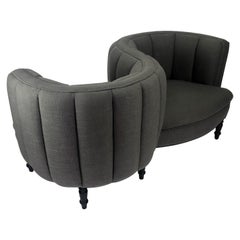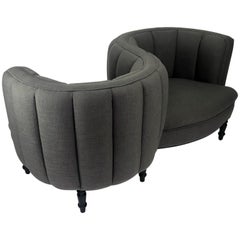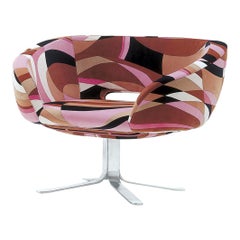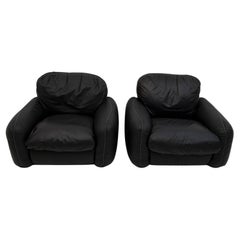Napoleon III Settees
Under Napoleon III’s rule, Paris underwent a great rebuilding overseen by Baron Georges-Eugène Haussmann, which created grand avenues and lavish landmarks like the Paris Opera. Antique Napoleon III–style furniture was flamboyant and eclectic. It was also known as Second Empire style since it followed and referenced the Empire style of his uncle Napoleon I.
Developing from 1852–70, Napoleon III furniture was plush and ornate, matching the fashion for masked balls and socializing in salons. It borrowed freely from earlier French styles including Louis XIV, Louis XV and Louis XVI as well as aesthetics from around the world, from antiquity to Asian art. As writer Gustave Claudin remarked in 1867, the country’s architects worked in “a style which one would be tempted to call neo-Greco-Gothico-Pompadour-Pompeian.”
Napoleon III chairs were completely covered with velvet and lined with tassels; pouf footstools invited people to put up their feet. Sofas were upholstered with tapestries, and beds were adorned with gilt bronze and theatrical canopies. The addition of conservatories to homes led to new indoor-outdoor furniture, while the spirit of hygiene promoted by Baron Haussmann inspired bright, floral motifs.
Although the most ostentatious designs were for the elite, as seen in the Napoleon III apartments preserved in the Louvre, where red velvet, gilding and chandeliers create a cacophony of luxury, these trends influenced homes across classes as manufacturing made design increasingly accessible. Papier-mâché furniture allowed for elaborate shapes that would have been difficult to carve in wood. The malleable material was painted with chinoiserie patterns and decorative designs. It was mass-produced by factories such as Jennens and Bettridge with varnishing and mother-of-pearl inlays creating an effect reminiscent of Asian lacquer. (Surfaces that had been “japanned” — a specialty of Jennens and Bettridge — were intended to resemble lacquer work that was created in East Asia.)
Find a collection of antique Napoleon III decorative objects, tables, seating and other furniture on 1stDibs.
2010s American Napoleon III Settees
Velvet, Wood
2010s American Napoleon III Settees
Wood, Velvet
21st Century and Contemporary Italian Napoleon III Settees
Metal
1970s Italian Vintage Napoleon III Settees
Leather
1970s Italian Vintage Napoleon III Settees
Synthetic, Faux Leather
1970s Italian Vintage Napoleon III Settees
Fabric, Wood, Velvet
1950s Italian Vintage Napoleon III Settees
Fabric, Beech
21st Century and Contemporary Italian Napoleon III Settees
Metal
1870s French Antique Napoleon III Settees
Brocade, Beech
2010s Belgian Napoleon III Settees
Steel
Late 19th Century French Antique Napoleon III Settees
Walnut
1960s Italian Vintage Napoleon III Settees
Metal
1950s Italian Vintage Napoleon III Settees
Velvet, Wood
1940s Italian Vintage Napoleon III Settees
Fabric, Beech







